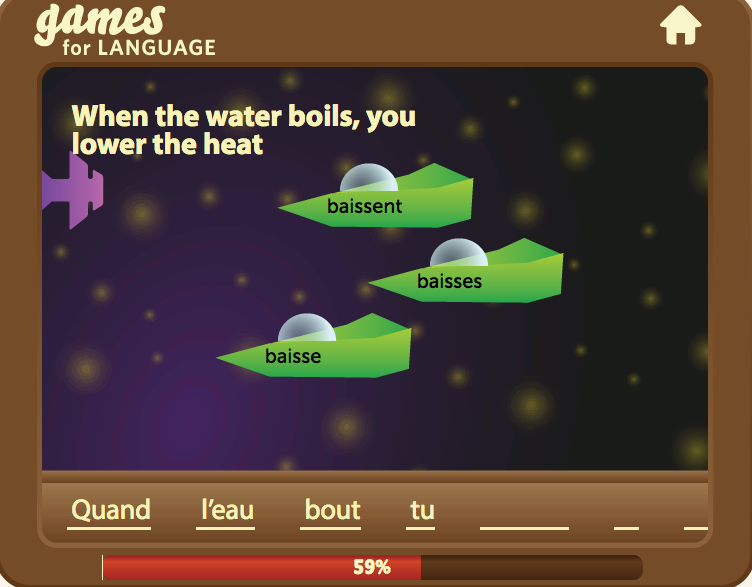Games for Language Learning and “Senior” Adults?
 Having reached the age when younger people kindly refer to us as “seniors”, we sometimes get remarks like this from friends and acquaintances:
Having reached the age when younger people kindly refer to us as “seniors”, we sometimes get remarks like this from friends and acquaintances:
“I was never good at learning a foreign language.”
“I'm too old for learning another language.”
“I don't think you can learn a language with games!” or
“I think playing games is a waste of time!”
Overcoming beliefs like that is often hard and we rarely try to convince those who have a set opinion.
But such negative remarks also point to perceptions that make it harder for older adults to learn a new language more rapidly.
To learn a language, you have to be enthusiastic, persistent and confident that you can do it.
Language learning should also be fun and interesting.
That's why listening to stories, watching movies and videos, engaging in one-on-one conversations are great ways to grow your vocabulary and fluency.
But how to get started and why not throw a few language games into the mix?
Simple, interactive games are not only a fun way to learn some language basics but also an easy way to get into a practice habit.
(A recent article of The University Network: Video Games: Not Just Fun And Games, According to SLU Professor describes how video games can be successfully used in class settings.)
Language Games for Kids
We all know that kids love to play. In fact, most, if not all of their learning in their early years occurs during play.
So it's not surprising that educational games – especially those on kids' tablets, smart phones, etc. are pouring into the market place.
These games combine playing with targeted learning.  They include educational topics from geography, math, spelling, science, to native and foreign languages.
They include educational topics from geography, math, spelling, science, to native and foreign languages.
There are numerous audio, video, and other “toy based” games and apps, which children play in their native language.
With these, they enhance word recognition, pronunciation, spelling, and writing.
And, games don't have to be on a laptop or tablet. There are blocks with numbers or letters; there are playing cards and board games like KLOO; and there are more and more battery operated toys that combine colors, movements, music, and language sounds into interactive learning centers for young children.
Kids play native and foreign language games - not because it helps them to better communicate with their parents, siblings, and peers - but because they provide interactive fun.
Language games teach them basic vocabulary, often with funny pictures, cute sound effects, and “rewards” for getting it right.
Language Benefits for Younger and Older Adults
In contrast to children, adults typically have a specific plan or need for the particular foreign language they are learning.
Younger adults will learn another language to enhance their career options, or because of friends, family connections, etc. They have to develop the discipline and learning habits to keep going in the midst of work and family commitments and time constraints.
The reasons older adults learn a new language often relate to family, new partners or travels. Many are also becoming aware of new research findings, which show the benefits of language learning for the older brain.
 The strongest evidence of such benefits comes from a decades-long study of 853 Scottish people, first tested in 1947 at age 11, and then retested in 2008-2010.
The strongest evidence of such benefits comes from a decades-long study of 853 Scottish people, first tested in 1947 at age 11, and then retested in 2008-2010.
Published in the Annals of Neurology in 2014, the study, titled Does Bilingualism Influence Cognitive Aging, the authors discuss the “protective effect of bilingualism against age-related cognitive decline.”
While the study does not make for easy reading, a number of key findings caught my attention:
- The protective effects are not explained by other variables such as gender, socioeconomic status, or immigration.
- The benefits appear to be independent of childhood intelligence (CI).
- Knowing 3 or more languages produced stronger effects than knowing 2.
- Little difference was found between active and passive bilinguals.
What I found especially interesting was the discussion of the study's limitations at the end of the article:
"Our study has limitations. The knowledge of language was defined by a questionnaire, not proficiency. Only few participants acquired their second language before age 11 years, so we could not study the classical cases of parallel, perfect, early acquisition of both languages. However, this limitation is also a strength. Millions of people across the world acquire their second language later in life: in school, university, or work, or through migration or marriage to a member of another linguistic community. Many never reach native-like perfection. For this population, our results are particularly relevant; bilingualism in its broad definition, even if acquired in adulthood, might have beneficial effects on cognition independent of CI (childhood Intelligence)."
Think about it. You don't even have to speak another language perfectly to acquire the benefits later in life.
This is good news for the many immigrants who have to flee their home countries.
But it's also good news for anybody who is learning another language but may never speak it fluently.
Your brain benefits from your learning effort anyway.
Adults Learning With Language Games
When we started learning Italian in our early sixties and Spanish a few years later, language learning games and gamified language courses or apps were not yet available. This was January 2011.
We found the The Rosetta Stone courses boring.
Duolingo didn't launch until November 2011 (see some of our Duolingo and Rosetta Stone Reviews) and we felt that Language Games could make learning and practicing a foreign language more fun.
We know from personal experience (and many other language enthusiasts agree) that the key to learning another language is regular - even daily - exposure to the new language.
Short, daily stints are fine. In fact, practicing each day for 20 minutes is much more effective than once a week for 2 hours or more.
But daily practice with boring lessons is hardly a very motivating proposition for a busy adult.
On the other hand, listening to a story sequel in another language appealed to us.
We've always used “easy readers” with accompanying vocabulary or translations. (For example, we love Olly Richard's Short Stories, which are also available as audio books.)
However, for anyone with no or little background in  the new language, we felt that interactive “comprehensible input” was needed. What better way than learning and practicing new vocabulary with language games?
the new language, we felt that interactive “comprehensible input” was needed. What better way than learning and practicing new vocabulary with language games?
That was our original idea for GamesforLanguage: Learning and practicing a new language “playfully”, or learning with games! Our site went live in September 2011.
Later we added Podcasts of the stories as well as Quick Language Games – over 200 by now – which only take 2-3 minutes to play,
Do we think that one can become fluent in a new language with our Gamesforlanguage courses?
No, we do not.
Becoming fluent requires much more listening and speaking practice than our courses - and most other online programs and apps – provide.
But, if our free courses can engage adults to play just one 15-20 minute travel-story lesson a day for 30 days and more - that may be the start of a learning habit.
The next steps would be to continue with reading and listening to other stories and to start speaking in the language you're learning.
More and more new “senior” adults, the “baby boomers”, are computer- and tablet-literate.
They are beginning to realize that learning a second or third language opens up social opportunities. Plus, they are becoming aware of the benefits another language has for the aging brain.
As the above quoted study shows:
You don't have to speak another language perfectly to acquire the benefits at any time in your life.
So why not start today and give your brain a good workout!
Bio: Peter Rettig is the co-founder of Gamesforlanguage.com. He is a lifelong language learner, growing up in Austria, Germany, and Switzerland. You can follow him on Facebook, Twitter and Instagram, and leave any comments with contact.
